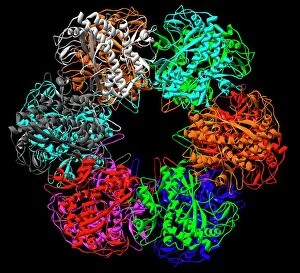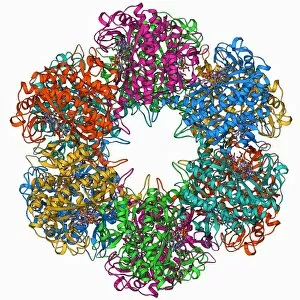Glutamine Synthetase Collection
Glutamine synthetase is a vital enzyme that plays a crucial role in various biological processes
For sale as Licensed Images
Choose your image, Select your licence and Download the media
Glutamine synthetase is a vital enzyme that plays a crucial role in various biological processes. Also known as GS, it is responsible for catalyzing the synthesis of glutamine from glutamate and ammonia. This process, called amidation, occurs in both prokaryotes and eukaryotes. The Glutamine synthetase enzyme F006 / 9598 has been extensively studied due to its significance in nitrogen metabolism. It acts as a key player in the assimilation of nitrogen into organic compounds within living organisms. By converting toxic ammonia into non-toxic glutamine, this enzyme ensures proper nitrogen balance and prevents cellular damage. Similarly, the Glutamine synthetase enzyme F006 / 9338 has garnered attention for its involvement in neurological functions. In the brain, GS maintains neurotransmitter homeostasis by regulating levels of glutamate and glutamine. Dysfunction or deficiency of this enzyme can lead to neurodegenerative disorders such as Alzheimer's disease or epilepsy. Moreover, Glutamine synthetase enzymes are found abundantly throughout different tissues and organs including liver, kidney, muscle, and immune cells. They exhibit tissue-specific expression patterns that reflect their diverse roles in maintaining overall physiological health. Research on these enzymes has also revealed their potential therapeutic applications. Targeting GS activity could be beneficial for treating certain cancers since tumor cells often rely heavily on glutamine metabolism for rapid proliferation.



